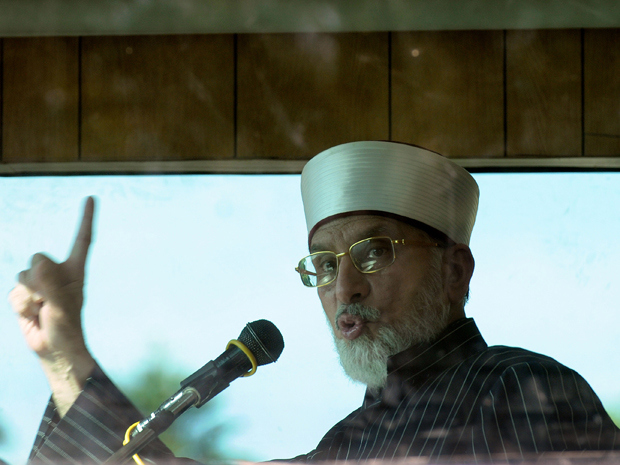Pakistanis took to streets on Wednesday demanding the government step down, a day after a court ordered the arrest of the Prime Minister Raja Pervez Ashraf.
 Pakistanis took to streets on Wednesday demanding the government step down, a day after a court ordered the arrest of the Prime Minister Raja Pervez Ashraf.
Pakistanis took to streets on Wednesday demanding the government step down, a day after a court ordered the arrest of the Prime Minister Raja Pervez Ashraf.
Tens of thousands of the followers of anti-government cleric Tahir Qadri gathered near the parliament building in the largest political protest in the country over the past years.
Earlier on Tuesday, Chief Justice Iftikhar Muhammad Chaudhry ordered officials to arrest 16 people accused of corruption in power generation projects in 2010, including PM Ashraf.
The Supreme Court order came as protesters led by populist cleric Qadri massed near parliament on the third day of a march, calling for the immediate dissolution of the government.
Security officials estimated the size of the Islamabad crowd on Tuesday at between 25,000 and 50,000, which would make it the largest political protest in the capital since the government led by the Pakistan People's Party (PPP) was elected in 2008.
The confluence of the court ru ling and Qadri’s protest stoked growing speculation that Pakistan’s powerful military was quietly supporting moves that would delay general elections that are due to take place this spring, most likely through the imposition of a military-backed caretaker administration.
ling and Qadri’s protest stoked growing speculation that Pakistan’s powerful military was quietly supporting moves that would delay general elections that are due to take place this spring, most likely through the imposition of a military-backed caretaker administration.
Qadri denies any ties to the Pakistani military and claims such accusations are being spread by those who are opposed to his movement.
In an interview with National Post, Qadri, who had lived in Canada for seven years, said he hoped to establish a socially free and progressive Pakistan, based on the tenets of Islam.
“Of all my demands, nothing I am asking is against the constitution of Pakistan and nothing I am asking is against the universal principles of democracy,” he said.
“In Pakistan we do not have effective democracy, we have electoral authoritarianism. The elections here are just a tool, to win elections by hook-and-crook, manipulation and corruption.”
